Now, before we get started, allow me to be clear: grimdark is great! It has its place in the fantasy spectrum, and many works that fall under the grimdark or gritty heading are classics. Obviously, we here at Tor.com love our Abercrombie and Martin—which, really, they need to also be a vaudeville team—but sometimes we want a fantasy that’s more optimistic. Just a little, guys! C’mon, we’re not asking for much…
The Goblin Emperor—Katherine Addison
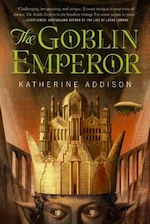
Katherine Addison’s delightful novel is about many things, but at its (lovable) heart it’s a story about realizing that sometimes your quirks are your greatest strengths. Maia, half-elven, half-goblin, becomes Emperor when his father and three elder brothers are assassinated. He has to learn how to rule a distrustful kingdom while he investigates the murder, navigates the byzantine politics of his (primarily Elven) court, and, hardest of all, stays true to himself. The story doesn’t shy away from the horrors of executions or the ugliness of prejudice, but it also focuses on the power of compassion to bridge social differences and effect change.
The Face in the Frost—John Bellairs
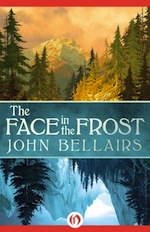
A wizard named Prospero (not that one) teams up with his old friend, the adventurer Roger Bacon (OK, maybe that one), to confront an evil power attacking their kingdom. They know going into the fight that they’re outmatched, but what else can they do? Bellairs’ story, like all of his work, juggles truly effective horror with quirky humor. The book gives weight to both elements, owning up to the terror that would come with a fight against evil, but also never wallowing in that terror to the point of overwhelming the humanity of the book.
The Copper Promise—Jen Williams
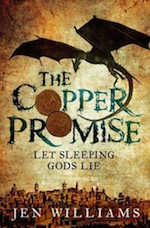
Williams’ novel combines some of the tropes of grimdark, e.g. mercenaries, torture, and tragic backstories, with some of the higher ideals of sword and sorcery. Best of all, it treats what could have been a slog through brutal battles as a lighthearted adventure. This bright tone, combined with a biting sense of humor, make the book fun as well as epic. The fallen knight is more complicated than we think, the swordswoman-for-hire is as handy with snark as she is with a sword, and… what’s this? The main character’s arc is one of rediscovering his humanity after a horrible trauma, rather than a slow degradation into despair? Is it possible?
Riftwar Series—Raymond E. Feist
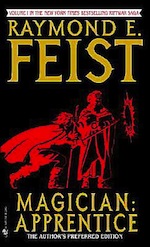
Several denizens of Twitter suggested Feist’s work as an antidote to grit! The central conceit of the Riftwar books are the rifts themselves—they can join worlds, but those who travel through them can seek communication and exploration, or war and conquest, and the series explores many permutations of these choices. Sure, it has has war right there in the name, but it also has characters who are willing to sacrifice themselves for the greater good, who take chances on trusting each other (and have that trust rewarded), rulers who choose mercy over murder, and candidates for the throne who abdicate so that better people can lead. We’re a long way from Westeros when we’re reading Feist.
Shannara Series—Terry Brooks
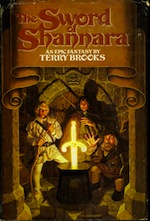
These are more high fantasy style, involving hero quests in addition to mundane acts of heroism. As he says in his 2003 book Sometimes the Magic Works, his “protagonists are cut from the same bolt of cloth as Bilbo and Frodo Baggins. It was Tolkien’s genius to reinvent the traditional epic fantasy by making the central character neither God nor hero, but a simple man in search of a way to do the right thing….I was impressed enough by how it had changed the face of epic fantasy that I never gave a second thought to not using it as the cornerstone of my own writing.“
Chrestomanci Series—Diana Wynne Jones.
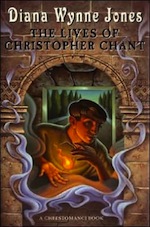
All of Diana Wynne Jones’ books could be on this list, but we’ll stick with the Chrestomanci Series, and particularly, The Lives of Christopher Chant. People die, parents split up, and villainous uncles trick nephews into nefarious schemes, but Wynne Jones still gives us characters to root for and dashes of hope. Christopher Chant himself is good-hearted (occasionally bitchy, but good-hearted), going out of his way to help a young goddess, and forging a friendship with the awesomely-named Throgmorten the Cat.
The Sun, the Moon, and the Stars—Steven Brust
Brust’s novel is about a painter creating oil paintings and putting an art show together. It’s also a retelling of the Hungarian tale of Taltos, who uses expert-level trickster skills to con the sun, moon, and stars away from the monsters who own them. The stories parallel each other in fascinating ways, but much of the weight is given to the modern story of a person who is part of both an artistic community and a supportive relationship. This allows the book to work as an inspiring tale of the value of art, rather than just another quirky fairytale mashup.
Range of Ghosts—Elizabeth Bear
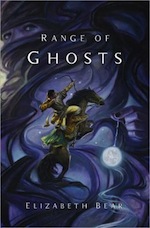 Range of Ghosts, the first book in Bear’s Eternal Sky trilogy, gives us an epic fantasy world influenced by Central Asian culture. Temur, a grandson of the Great Khagan, and Samarkar, the former princess of the Rasa dynasty who abdicated her royalty to become a wizard, must stand together against the hidden cult that has caused civil war throughout the empires of the Celadon Highway. While this is a complex book, with layers of religious tradition and political intrigue, Bear also focuses on the characters at the story’s center, and, as Liz Bourke said in her review, “the significance of a single life, united with other single lives,” and “moments of kindness and stillness amidst the horror of war,” creating an epic with a beating, human heart.
Range of Ghosts, the first book in Bear’s Eternal Sky trilogy, gives us an epic fantasy world influenced by Central Asian culture. Temur, a grandson of the Great Khagan, and Samarkar, the former princess of the Rasa dynasty who abdicated her royalty to become a wizard, must stand together against the hidden cult that has caused civil war throughout the empires of the Celadon Highway. While this is a complex book, with layers of religious tradition and political intrigue, Bear also focuses on the characters at the story’s center, and, as Liz Bourke said in her review, “the significance of a single life, united with other single lives,” and “moments of kindness and stillness amidst the horror of war,” creating an epic with a beating, human heart.
The Dragon’s Path—Daniel Abraham
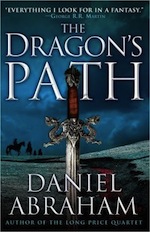
The Dragon’s Path is epic fantasy that picks up after the dragons have gone, leaving behind thirteen races who were bred to serve them. Now those races squabble and war with each other as they try to map an economy and political destiny. While there is a lot of page-time spent on pseudo-Renaissance banking systems, Abraham also takes the time to give us several point-of-view characters that enrich the story with humanity. He chooses to focus on a higher-class couple who would probably be the villains in most books, but here are made worthy of empathy.
Little Big—John Crowley
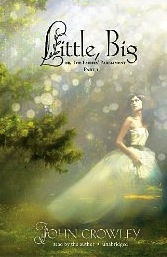
Little, Big unfolds over nearly a century, as the Drinkwater clan builds an intricate relationship with the world of faerie. We meet the human family, hear rumors of magical beings, visit a dystopian City, and spend some time with a Grandfather Trout who might be a cursed prince. Crowley isn’t afraid to slow down and ponder heady subjects like free will and fate, or to tell his story through intricate detail and gorgeous language, which led to a novel that Ursula le Guin said, “…all by itself calls for a redefinition of fantasy,” and Thomas Disch called “the best fantasy novel ever. Period.”
Lyonesse Trilogy—Jack Vance
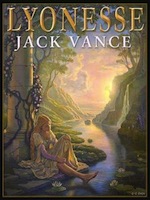
This trilogy melds Arthurian stories, chivalric tropes, and Celtic mythology into a story of a despotic king, his daughter, and her lover. Since Vance took elements from several different medieval periods and used those elements to bring life to his own magical lands, he can play around with references to stories and echoes of themes, such as the fall of Atlantis, without being tied to an expected narrative. While the story itself is not exactly lighthearted, it does feature plenty of humor, fun, and romance. He also uses the Atlantean references to tinge the whole story with melancholy—how long can Lyonesse last? Does the possibility of the Kingdom’s end overshadow the joy that can be had in the moment?
The Innkeeper’s Song—Peter S. Beagle.
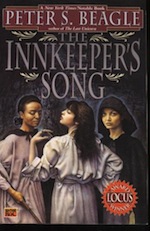
We talk about The Last Unicorn a lot on this site, because The Last Unicorn is fucking awesome. But! Peter S. Beagle did so much more! So when a Twitterer mentioned Beagle’s work, I decided to highlight The Innkeeper’s Song. Beagle jumps across multiple points of view to weave several different quests together. Tikat pursues his childhood love, whom he saw resurrected by magicians. Lal and Nyateneri, the magicians, are racing to save their old mentor from his powerful but evil student. Lukassa, the resurrected girl, has her own path to pursue. And the Innkeeper himself must take them all in, even though he knows they bring trouble with them. Through nested quests and elegant language, Beagle tries to get to the heart of death, love, and duty.
The Curse of Chalion Series—Lois McMaster Bujold
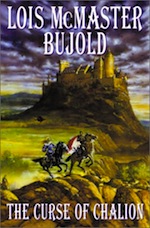
This series is a melding of fantasy and theology informed by elements of medieval Spanish history and mysticism, especially the reign of Ferdinand and Isabella in the late 15th Century. The Curse of Chalion follows Lupe dy Cazaril, who returns home after war and enslavement to try to live a quiet life, but instead finds himself working to lift the curse that lays on the royal family that has acted as his patron. A little bit epic, a little bit slice of (imaginary, alternate universe) life, the series takes questions of morality and duty seriously, without succumbing to endless bouts of violence or despair.
So, this is our list, but we’re sure there are more upbeat fantasies out there—give us your suggestions! Do you want some light to cut through the grimdarkness, or are do you prefer your fantasy as gritty as possible?
Leah Schnelbach believes that the grimdarkness of her own personal far future will be averted if she gets to read a sequel to The Goblin Emperor.










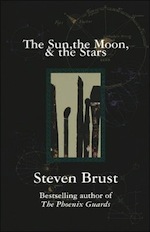
Importantly, where is that Cupid illustration from and was its context commensurately marvellous?
The Princess Bride has got to be mentioned, surely?!
@1, are we entirely sure that the engraving DOES represent Cupid changing his image LOL? There’s a reason Cupid is represented as a little kid, and it’s not because love is cute. It’s because there is nothing in the world meaner than a middle-school age boy (he gets younger and younger as you leave antiquity). That Cupid would be right at home in Apollonius of Rhodes.
I’d throw “Winter’s Tale” by Mark Helprin into the ring.
I have fond memories of Gilliland’s Wizenbeak trilogy, although I do have to say it probably doesn’t pay to get too too attached to the secondary characters.
Hey, remember that big push Ace – I think it was Ace – gave the reprint of John Myers Myers’s Silverlock, way back in 1980?
What about any of the Discworld series? They’re wonderfully life-affirming!
Second, on the Discworld books — particularly (for me) Small Gods, which I find a comofort in hard times.
@1 The Cupid pic is the tailpiece by Gustave Doré from his illustrations for Orlando Furioso. My Dover edition says the drawing is “Doré’s acid commentary on the heroics of love and war.”
I was going to say, “_Nation_, or your favorite Discworld book.”
_The Copper Promise_ sounds great, I’d never heard of it. I will put it on a wishlist to await an ebook version.
Author David Eddings is another one. The antics of Sparhawk, Belgarion and their friends are just light reading.
I feel like Trudi Canavan’s work fits pretty well here. I have some disagreement about whether Abraham’s should be here, but if it is here, then certainly Long Price Quartet should be too. Howard Andrew Jones. Guy Kay.
How about Tad Williams’s Memory of Sorrow and Thorn series?
Not sure the Dagger and the Coin works as “life affirming”. Some really dark things happen (including a city put to the sword).
I’m a broken record on this, but Jacqueline Carey’s Kushiel’s Dart series.
I’d add Rachel Aaron’s Legend of Eli Monpress books to this list. They’re a lot of fun to read, and Eli Monpress is not only a charming rogue, but a wizard with unique talents as well. I’d highly recommend this series if you need to get away from dark fantasies for a while.
Let me add my favorite series: Jacob’s Ladder by Eliz. Bear- so much better than The Broken Skies—
Wonderful idea. Can second several of these. Too bad there will be
no sequel to The Goblin Emperor.
I loved the Kushiel series, but readers had better be comfortable with graphic descriptions of S & M sex.
How about a regular post on non-grimdark fantasy; also one on non-grimdark SF?
And (a wild wish indeed) publishing some short stories on Tor.com with happy endings??
Wowies! You all forgot one! Kojiki, by Keith Yatsuhashi, is seriously unlike anything you’ve read before in it’s genre. I’m not even sure that classing it into any particular “box” is particularly right either, because this book will thrill anyone from young adult to those who are ridiculously finicky when it comes to their reading material.
I’m a huge fantasy lover, I also enjoy anime, I think the Japanese culture is exceptionally rich in their heritage, and their sense of honor above all. Two of my favorite things have been incorporated into this book!
It is as far from dark and depressing as is possible, the very characters who make up the story are the stuff of light itself. It keeps you turning pages like a whirlwind, desperate to see how your personal favorites turn out in the end. Throughout the experience, your mind is free to concoct imagery fit for a dream, you live the story as it’s told to you, you’re a part of it, and the storyline itself is so fresh and exciting, being completely different from the typical struggle between man and mage or man and dragons or any other combinations we’ve all heard and seen before.
Imagine entering a world you’ve never set foot in before, but that feels “right” to you for the first time in your life. Watch as secrets are uncovered, danger looms imminent like a dark thunderhead, and the whole trip, you’re hanging on with glee and joy in your heart, hoping that it turns out right in the end.
I can’t tell you that part, nor anything else that will spoil the reading, but it’s safe to say, expect to be most pleasantly surprised by this book. It’s such an easy read because it satisfies a monstrous hunger within any reader.
Just about anything by Charles de Lint (with the possible exception of the books he published as Samuel Key) is going to be life-affirming. As far as Pratchett, while I love everything, the Tiffany Aching books are particular favorites.
Bit of an old one but I could not recommend Ursula Le Guin’s Earthsea Quartet anywhere near enough. Every time I reread it I experience a profound sense of joy at Ged’s reimagining of himself in Tehanu. Not that there is no grit under the wheels…
YES! YESYESYESYES! Just Yes. User currently incoherent with joy from seeing such wonderful books on the list!
I absolutely second Eddings, Jacqueline Carey (though bits are … difficult to read), and Pratchett.
I would add: Mercedes Lackey, Christopher Moore, Weis and Hickman (the older stuff – I have no idea what they’re writing now, individually or collectively), Robert Jordan/Brandon Sanderson, Brandon Sanderson by his lonesome ….
I’m trying to come up with current authors, but I haven’t had as much time as I’d like to read.
So glad to see LM Bujold on this list, can’t recommend her highly enough. :) Also Peter S. Beagle, yeah.
I’ll second (third, fourth, whatever) Terry Pratchett and Guy Kay. If you want fun with a dash of snark, try anything and everything by Martha Wells. For smart and fun, try Dave Duncan. For poetic and etherial, Patricia A. McKillip. For poetic and fun with some LGBT characters, can’t do better than Ellen Kushner.
I read Fuzzy Nation a long long time ago and still remember it fondly. It’s fantasy literally built on concept of respect for life. Forgot the author though. But book is as pro-life as any thing
Excellent post, and full of books I’ve never read (but will be adding to my list of want to read!). I don’t mind stories that are grimdark (another new word for me) but only if there’s some thread of hope that can be grasped. Stories where it’s all despair and there’s no chance of a happy ending just don’t do it for me.
Add me to the list of people recommending Jacqueline Carey’s Kushiel series. About the only thing that makes me feel better about humanity than those books is one of Captain Picard’s speeches.
(Also seconding the LMB love, though if this were not a fantasy-specific list I’d give the Vorkosigan Saga the slightest edge over the Chalion books.)
While not always ‘upbeat’, exactly, (characters definitely die, and you WILL cry about it) I have to say I never read a series of books more life-affirming than the Young Wizards series by Diane Duane.
(Extra recommendation goes out for the New Millenium Edition ebook versions, which brought the series more up-to-date with modern times (they were started in the 80s), as well as fixing some issues of autistic representation in the sixth book, following critiques of it.)
It always makes me sad to see people mention the Riftwar without mentioning that significant portions of the setting were taken from M.A.R. Barker’s world of Tekumel, probably unwittingly. Feist, when given a chance to acknowledge this debt and make restitution during Barker’s lifetime, failed to do so in any public way.
Far better to swap Guy Gavriel Kay, John Myers Myers, Lord Dunsany, or T. H. White* into the list in his stead.
*Seriously, if you like Peter Beagle, it’s definitely worth reading the man who had the most influence on his prose. Beagle is his own writer, though!
I discovered The Face in the Frost after reading a review by Lin Carter that described it as giving one “the peculiar sensation of laughing out loud while one’s hair is standing on end”.
Bellairs depicts *real* magic in his stories, not the “lightning bolts from the fingertips” style that I find unfeasible.
Two that haven’t been mentioned so far that I really like are Dave Duncan’s Man of His Word series and the Swordsman trilogy, and Harry Turtledove’s Lost Legion series.
Definitely second both the entire Discworld series, whether its the Death cycle or the Sam Vines cycle or the Moist von Lipwig cycle, and also second David Eddings, whose simplistic but undeniably epic stories, which got me into adult fantasy in the first place, never fail to bring me comfort
Martha Wells’ Raksura books are really satisfying on the outcast-finding-a-home, social negotiation, and worldbuilding front (though the third feels a little long and repetitive).
I’d add Ben Aaronovitch’s Rivers of London books. I always crack a smile at something in there. J V Jones’ The Barbed Coil is also one of my go-to books.
I don’t know if they would exactly be fantasy, but I strongly recommend any of Zenna Henderson’s stories of The People, castaways after their world was destroyed. Where Earth went machine, The People developed psi abilities, and the refugees’ attempts to fit into post Civil War frontier America (without being burned as witches) are as gentle and affirming as possible.
tsq3, if you liked Fuzzy Nation then you should read Little Fuzzy by H. Beam Piper. It’s the book that Fuzzy Nation was reimagined off of.
Brandon Sanderson is amazing. Another one is Elizabeth Moon. They are both able to touch on difficult and deep subjects while having characters that you can love and belive in. Very uplifting books.
Alex Bledsoe’s The Hum and the Shiver is wonderfully life-affirming. And Howard Andrew Jones’ Bones of the Old Ones and the others of that series are old school adventures written with a more modern-day approach.
Discworld, especially some of the oddballs. Monstrous Regiment, or Small Gods are wonderfully humorous takes to extremely grimdark concepts.
Also George MacDonald or Lloyd Alexander have many wonderful life affirming books. I have read it in ages but the “Princess and the Goblin” and the “Princess and Curdie”. It was also way before its time in that it subverts the “Princess in need of rescue” trope.
I like most of the above mentioned books as well as the ones recommended in the comments. I’d add at the very least Bridge of Birds to the list. And possibly all of the humorous fantasy out there outside of Pratchett who has already been mentioned like L. Sprague de Camp, Lawrence Watts and the like. Funny books are generally uplifting. Generally. And a recently published lesser known one, Dragons of Wendal by Maria E. Schneider.
Actually, to amend my previous comment – the “Princess and Curdie” probably is more a mixed bag between life affirming and cynical.
Forgot to mention Unicorn on Speed Dial as well. Good family dynamics, quirky humor, serious issues handled without being preachy, grim or stuffy.
Rachel Pollack’s Unquenchable Fire tops my list. Everyday yet touched by the divine. Her Godmother Night is another pick.
Thank you for highlighting The Face in the Frost and Little, Big! These should be much better known than they are.
Patricia Wrede’s work definitely falls in this range, running straight through from her Lyra series to her faux-Regency fantasies (both the collaborations with Caroline Stevermer and her solo work) to her newer faux-frontier series beginning with Thirteenth Child.
I’m also minded to recall the extended series of cross-mythic fantasies by the late Tom Deitz, beginning with Windmaster’s Bane; these combined elements of classic Celtic folklore with well-grounded Native American traditions, mostly set in and around rural Georgia.
Much, much more obscure but worth tracking down: the 1980s novels of Linda Haldeman: the English country fantasy The Lastborn of Elvinwood, the academic occult yarn Esbae, and the quiet, almost Bradbury-like small-town Americana of Star of the Sea. I really, really wish she’d lived to pursue a much longer career, in which she might well have become one of modern fantasy’s very brightest lights.
Kate Griffin’s Matthew Swift/Urban Magic books and their Urban Shaman spin-offs. Brilliant, intense, hugely inventive evocations of London and the (literal) magic generated by the life of a great city.
Her YA steampunk and fantasy novels written as Catherine Webb are also cheerful and optimistic, notwithstanding an underlying seriousness in the world and the plots.
I just finished rereading One for the Morning Glory by John Barnes. Very droll. If you like The Princess Bride and a punny sense of humor, give it a try.
Has anyone read “Little, Big” by Crowley? Before I buy it, I want to know how much magic is in the story. While I love GRRM’s “A Song of Ice and Fire”, I prefer the density of magic in the narrative to be somewhat higher than it is in ASOIAF. So, is there a lot of breaking of reality in “Little, Big”?
Before Elizabeth Ann Scarborough collaborated with Anne McCaffrey, she wrote the delightful Songs from the Seashell Archives quartet which I heartily recommend. Katharine Kerr’s Deverry series is also realistic but not ridiculously grim and one of my all time favourites.
A second (third?) on Guy Gavriel Kay for this list. Especially The Lions of Al-Rassan.
Quinne @46: It’s very, very difficult to compare Little, Big with any medieval-esque fantasy epic. L,B is a blend of fantasy, generation-saga novel, and science fiction* told in dense, languid, 19th century prose. It involves a family whose lives are intimately intertwined with faerie royalty. The first chapter includes a walk through the wild, exotic landscape of New Jersey, discussions of proofreading errors in telephone books, and a giant talking trout. There’s really nothing quite like it.
*Yes, science fiction: the later chapters are set in the decaying future of the late 1990s as America slouches to dystopia.
My first thought was anything by Robin McKinley. I have a hard time picking a favorite but the Blue Sword might be a the top of my list. I always feel such joy at conclusion of her books.
Good heavens, doesn’t anybody remember Piers Anthony’s “Xanth” books? The first six or eight (before the series devolves into formulaic silliness) are impressive storytelling of serious themes with a thick icing of puns.
I also second DeLint, and add Maria V. Snyder’s “Poison Study”.
Thank you for this post and to everyone for all the comments!!! (assembling a wish-list now….)
James Davis Nicoll @6,
Yay, Silverlock. Plus, I think there’s a NESFA reprint in hardcover.
Non-grimdark fantasy? Are we forgetting Robin McKinley?
@43….THANK YOU! I read Tom Deitz years ago & in recent months have been intermittently thinking of the David Sullivan series but was unable to remember Deitz’ name, or the title of any books, or the character’s name. I still have all the books, but they’re packed away. So you just solved a small mystery for me. And yes, I 2nd the nomination to include Deitz in this list.
Any of Sharon Shinn’s marvelous fantasies are a great antidote to grimdark. And I second the idea of columns highlighting books like these. I just can’t do grimdark anymore and love seeing the suggested alternatives.
Another fine antidote for the grimdark, or for even a lingering case of the blues? Bridge of Birds, from Barry Hughart. Number Ten Ox is so earnest, Master Li so shrewd, the world so rich and vibrant.. it’s like chicken soup for the grimdark soul.
@51. otterdaughter–I loved the Xanth books in middle school! They were so silly and fun, and I felt so cool finally reading some of my dad’s books, who has always been a huge fantasy/SF reader.
I also really loved the “Myth Adventures” series by Robert Asprin, Bring Me the Head of Prince Charming by Roger Zelazney and Robert Sheckley, and the Castle Perilous series by John DeChancie. Not sure how well they’ve held up over time, but I remember really loving the goofiness and feeling like I was in on the joke!
I can’t wait to try some of the other series suggested–spring calls for some lighter reads!
I’m stunned that nobody has mentioned McKillip; she doesn’t do fluffy-bunny fantasies, but none of her work is grim and a lot of it is about people consciously choosing not to walk the dark path. The Forgotten Beasts of Eld is her first non-YA; IMO it still holds up.
There is some of which you spoke of about Riftwars in Westeros, it’s just usually not in the forefront. Maester Aemon was supposed to be the King of Westeros but he abdicated.